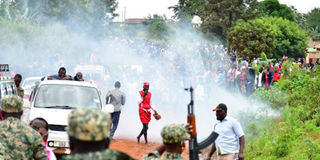Ugandans, polls will come and go

The shooting dead of the bodyguard of Busia Municipality Member of Parliament Geoffrey Macho has kicked up political undertones in the border district.
On Sunday, Pte Ivan Kakai, a Uganda People’s Defence Forces soldier attached to the Military Police, was shot dead at Divine Healing Centre International Church in Sofia B Village in Busia Town at about 10am as he kept watch of the MP who was attending prayers.
Already, sections of the public think the incident was politically motivated even when investigations into the killing continue. This then brings us to a very pertinent issue as we dive into the high-octane political season; managing differences in political opinions and beliefs.
Many times, attention is paid to the violence meted out by security operatives on members of the public, but very little attention is paid to the violence among citizens themselves.
Naturally, humans tend to take sides in any given contest. And the political platform offers the best avenue for contestation whether at family level, school, work place, social gatherings or at community level.
In the next two months, it will be common to find friends, spouses, workmates, or acquaintances disagreeing over a political candidate or party – which is fine and should be healthy. However, for some, it might not end well.
There have been instances of spouses developing a misunderstanding because of political differences, which leads to divorce or marital disruptions.
Friends, workmates, etc, may not work well again because of such differences. At community level, it often leads to fights, breakdown in family relationships, and in extreme cases may result in loss of life in the event that conflicting camps engage in violent acts.
Between March and July last year, a civil action group, Democratic Engagement and Action, conducted a study in 13 districts on the coming election.
The report indicated that about 89 per cent of those interviewed said they feared the election could become violent. The reasons included lack of electoral reforms, unresolved tribal issues, and the involvement of security agencies in partisan politics.
While some of these issues might not be fixed now, there are issues at our homes and community that we can sort out. As we support our respective candidates, let us respect each other’s choices and accept that all of us cannot have the same preference.
We also ask the government to ensure that there are good counselling services at communities and available dispute resolution avenues at the lowest level. We cannot afford to lose our heads over elections that come and go.




